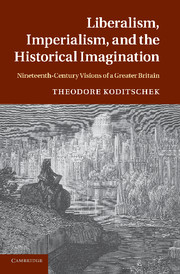 Liberalism, Imperialism, and the Historical Imagination
Liberalism, Imperialism, and the Historical Imagination Book contents
- Frontmatter
- Contents
- Acknowledgements
- List of abbreviations
- Introduction
- 1 Imagining Great Britain: Union, Empire, and the burden of history, 1800–1830
- 2 Imagining a British India: history and the reconstruction of Empire
- 3 Imagining a Greater Britain: the Macaulays and the liberal romance of Empire
- 4 Re-imagining a Greater Britain: J. A. Froude: counter-romance and controversy
- 5 Greater Britain and the “lesser breeds”: liberalism, race, and evolutionary history
- 6 Indian liberals and Greater Britain: the search for union through history
- Epilogue: From liberal imperialism to Conservative Unionism: losing the thread of progress in history
- Index
- References
1 - Imagining Great Britain: Union, Empire, and the burden of history, 1800–1830
Published online by Cambridge University Press: 04 April 2011
- Frontmatter
- Contents
- Acknowledgements
- List of abbreviations
- Introduction
- 1 Imagining Great Britain: Union, Empire, and the burden of history, 1800–1830
- 2 Imagining a British India: history and the reconstruction of Empire
- 3 Imagining a Greater Britain: the Macaulays and the liberal romance of Empire
- 4 Re-imagining a Greater Britain: J. A. Froude: counter-romance and controversy
- 5 Greater Britain and the “lesser breeds”: liberalism, race, and evolutionary history
- 6 Indian liberals and Greater Britain: the search for union through history
- Epilogue: From liberal imperialism to Conservative Unionism: losing the thread of progress in history
- Index
- References
Summary
There is no European nation which, within the course of half a century or little more, has undergone so complete a change as this kingdom of Scotland. The effects of the insurrection of 1745 – the destruction of the patriarchal power of the Highland chiefs, the abolition of heritable jurisdictions of the lowland nobility and barons, the total eradication of the Jacobite party … commenced this innovation. The gradual influx of wealth and extension of commerce have since united to render the present people of Scotland a class of beings as different from their grandfathers as the existing English are from those of Queen Elizabeth's time.
Walter Scott, Waverley [1814] (London, 1972), “Postscript,” 492The history of colonies has in it some points of peculiar interest as illustrating human nature. On such occasions the extremes of civilized and savage life are suddenly and strongly brought into contact with each other, and the results are as interesting to the moral observer as those which take place on the mixture of chemical substances are to physical investigation.
Walter Scott to Robert Southey, March 23, 1818, in Scott, The Letters of Sir Walter Scott, ed. J. C. Grierson (London, 1933), V: 115On September 7, 1798, an Anglo-Irish gentleman, Richard Edgeworth, gathered his wife, eldest daughter Maria, and six other children. Abandoning their ancestral home in fear for their lives, the family hastened to the relative safety of the Protestant enclave of Longford Town with a train of mixed Protestant and Catholic yeomanry in tow.
- Type
- Chapter
- Information
- Liberalism, Imperialism, and the Historical ImaginationNineteenth-Century Visions of a Greater Britain, pp. 17 - 55Publisher: Cambridge University PressPrint publication year: 2011


